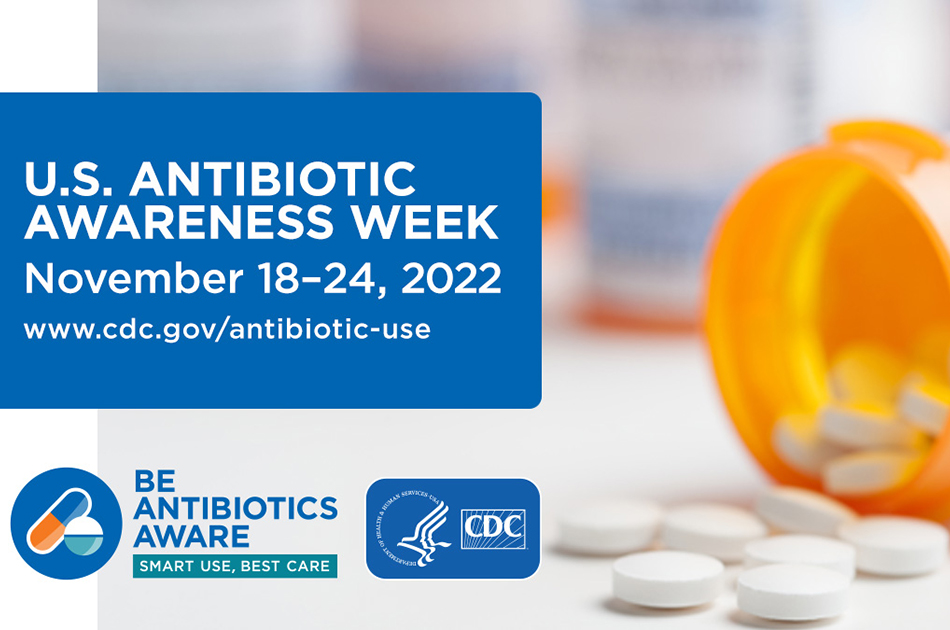U.S. Antibiotic Awareness Week
WILL COUNTY HEALTH DEPARTMENT
Antibiotics can save lives, but they aren’t always the answer. November 18-24 is U.S. Antibiotic Awareness Week.

U.S. Antibiotic Awareness Week (USAAW) is an annual observance highlighting the importance of improving antibiotic prescribing and use, also known as antibiotic stewardship. Improving the way healthcare professionals prescribe antibiotics, and the way we take antibiotics, helps keep us healthy now, helps fight antimicrobial resistance, and ensures that these lifesaving drugs will be available for future generations. CDC encourages healthcare professionals, patients, and families to learn more about antibiotic prescribing and use.
When antibiotics aren’t needed, they won’t help you, and the side effects could cause harm.
Here are seven facts you should know to Be Antibiotics Aware:
- Antibiotics can save lives. When a patient needs antibiotics, the benefits outweigh the risks of side effects or antimicrobial resistance.
- Antibiotics aren’t always the answer. Everyone can help improve antibiotic prescribing and use.
- Antibiotics do not work on viruses, such as those that cause colds, flu, or COVID-19. Other medications, like antivirals, can treat viruses.
- Antibiotics are only needed for treating infections caused by bacteria, but even some bacterial infections get better without antibiotics, including many sinus infections and some ear infections.
- Antibiotics will not make you feel better if you have a virus. Respiratory viruses usually go away in a week or two without treatment. Ask your healthcare professional about the best way to feel better while your body fights off the virus.
- If you need antibiotics, take them exactly as prescribed. Talk with your healthcare professional if you have any questions about your antibiotics, or if you develop any side effects, especially diarrhea, since that could be a Clostridioides difficile infection (also called C. difficile or C. diff), which needs to be treated. 7. Antibiotics are critical tools for treating life-threatening conditions, such as pneumonia and sepsis.
Did you know antimicrobial resistance is one of the most urgent threats to the public’s health? Here’s what else you need to know about antimicrobial resistance and side effects:
- Any time antibiotics are used, they can cause side effects and lead to antimicrobial resistance.
- Antimicrobial resistance occurs when bacteria no longer respond to the drugs designed to kill them.
- Common side effects of antibiotics can include rash, dizziness, nausea, diarrhea, and yeast infections.
- More serious side effects include Clostridioides difficile (or C. diff) infection, which causes diarrhea that can lead to severe colon damage and death. People can also have severe and life-threatening allergic reactions.
Do your best to stay healthy and keep others healthy by:
- Cleaning hands by washing with soap and water for at least 20 seconds or using a hand sanitizer that contains at least 60% alcohol.
- Covering your mouth and nose with a tissue when you cough or sneeze.
- Staying home when sick.
- Getting recommended vaccines, such as a flu vaccine and a COVID-19 vaccine.
YOU CAN PARTICIPATE IN CDC’S U.S. ANTIBIOTIC AWARENESS WEEK EVENTS, OR HOST YOUR OWN.
There are many ways to get involved! Visit www.cdc.gov/antibiotic-use to learn how to participate.
To learn more about antibiotic prescribing and use, visit www.cdc.gov/antibiotic-use, or call 1-800-CDC-INFO (1-800-232-4636).
Para saber más sobre cómo recetar y usar antibióticos, visite www.cdc.gov/antibiotic-use/sp/, o llame al 1-800-CDC-INFO (1-800-232-4636).
